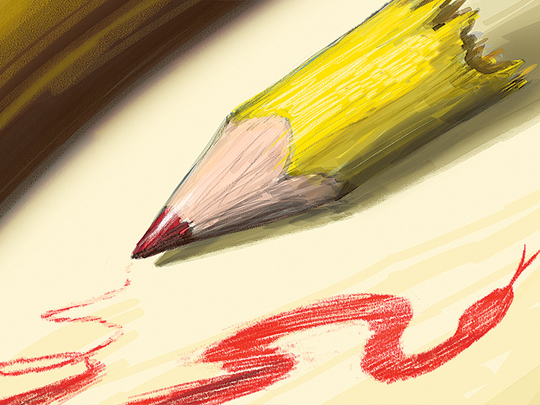
The massacre of ten journalists and two police officers, with four others left critically wounded, in Paris last Wednesday was not only vile, but dastardly as well, for it would appear that it was committed (Oh, the horror, the horror!) in the name of Islam — a faith that thrived as a civilisation during the long reign of the Islamic Commonwealth of Nations, precisely because of the respect it evinced for the life of the mind. This was the heritage that the three suspected perpetrators of the massacre tore to shreds.
The attack, which took place in broad daylight, was directed at the staff members of the satirical magazine Charlie Hebdo, who, at the time, were in the middle of an editorial meeting.
No resort to hyperbole here when we say that the event shocked not just France, not just Europe as a whole, not just North America, but the entire world, including our part of it.
And well it might, for rational human beings do not go around killing people engaged in the journalistic enterprise because one does not agree with the views they express, regardless of how repugnant those views are.
Freedom of expression is sacrosanct in the Euro-American world. In that world, even Nazis, unrepentant racists and political extremists of all stripes are tolerated, irrespective of their venomous effusions and their reprehensible take on objective reality.
And Charlie Hebdo, which repeatedly courted controversy by its irreverent, at times crude, depictions of our Prophet (PBUH), is no different. Or should not have been different.
French President Francois Hollande called the massacre a terrorist attack of “exceptional barbarity”. His American counterpart called it “horrific”. The Arab League, on behalf of all countries in the Arab world, strongly condemned it. United Nations Secretary-General Ban Ki-moon called it a “cold-blooded crime”. On Thursday, vigils were held in cities around Europe and a sombre mood descended on the continent.
And for a columnist who earns his living stringing words together as a contributor to daily newspapers, the thought of heavily-armed, fanatic assailants barging into the offices of a magazine and killing four of its well-known cartoonists, along with its editor, as they held their weekly editorial meeting, is especially egregious.
The attackers, clearly semi-literate oafs one and all, must have had little understanding of what satire is and what venerable role that tradition had played in western culture.
In French journalism, the tradition goes back to pre-revolutionary France, when it was deployed — with insolence and bite — as a vehicle by satirists to denounce and mock not only politicians, but the excesses of Marie Antoinette herself. To French satirists, including ‘philosophes’ like Voltaire, there was no holy cow to steer clear from.
Everybody was game. In the English-speaking world, the tradition stretches all the way from Mark Twain and Oscar Wilde in the late 19th century to the American publication The Onion today. In Britain, there is a television show That Was the Week that Was and the US has had the Smothers Brothers.
And just as in the classical Arab world reading poetry was considered the best way to understand the ethos of one’s culture and the zeitgeist (the defining spirit or mood of a particular period of history) of the times, so was satire in ancient Europe — going back to Aristophanes, the comic playwright of ancient Athens whose irreverent humour around 450 BC targeted not just politicians but the most sacred facts of faith — able to recreate the life of ancient Athens more convincingly than any other medium.
Back to Charlie Hebdo. True to its satirical ways, the magazine was not just disrespectful of anyone and everyone, anything and everything — that is the nature of the beast — but a foe to all religions, not excluding Islam.
To its contributors, if Muslim folks did not appreciate that, then they did not appreciate that. Case closed. When in 2007, for example, the editor, Stephane (“Charb”) Charbonnier was sued by Muslim groups in France for his decision to publish a dozen Danish cartoons of the Prophet (PBUH) that Muslims considered offensive (and they indeed were), the plaintiffs lost. The court determined that the cartoons were covered by freedom of expression laws.
Then, emboldened by its legal victory, Charlie Hebdo published a steady stream of provocative cartoons, which it said were an attack not on Islam but “Islamists”. In 2011, building on its right to insult religions, it went further: Charlie Hebdo hit the stands as the temporarily renamed Charia Hebdo, a crass subversion of the Arabic word ‘sharia’.
Asked by a reporter soon after the court fracas whether his Muslim opponents might one day make him yield to pressure, he said it would happen “il faudra me marcher sur le corps” (over my dead body).
Satirical cartoonists with Indian ink have never killed people but, as the horrific news from Paris last Wednesday would attest, fanatics with assault rifles have.
Arnold Toynbee showed us in his monumental 12-volume Study of History that sometimes when different cultures encounter each other, they end up colliding instead of colluding. Whichever way you look at it, the massacre in Paris was the darkest day in the history of French journalism.
Fawaz Turki is a journalist, lecturer and author based in Washington. He is the author of The Disinherited: Journal of a Palestinian Exile.








